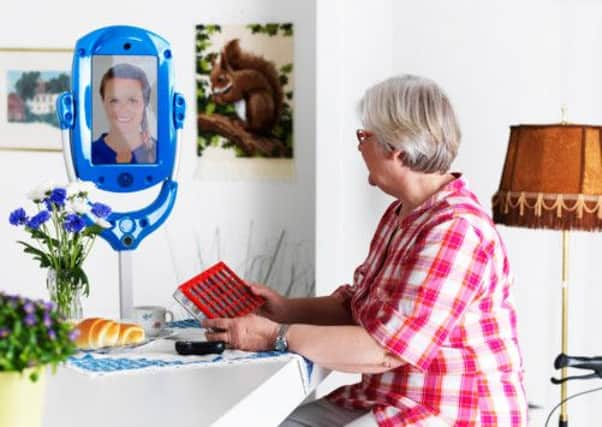Robots to assist Western Isles dementia sufferers


The machines will allow relatives and carers to check on them, potentially from hundreds of miles away.
The “Giraff” robots are just under five feet tall, with wheels and a TV screen instead of a head. The screen will allow for two-way conversations in a video-call system. The operator can also drive the robot around the house to check that medication is being taken and food eaten.
Advertisement
Hide AdAdvertisement
Hide AdNHS Western Isles will be piloting the robot scheme for the first time in Scotland as part of the European Union project Remodem, which aims to find new ways to support people with dementia living in remote communities.
Health board bosses said that earlier trials in Australia had shown people with dementia were not afraid of the machines. They hope the robots will help people living alone in remote areas feel less lonely.
The board’s chief executive Gordon Jamieson said: “This is an interesting idea and we are very much testing new ground here. It is well recognised that care of the elderly in general and the care of people with dementia in particular is one of the major challenges facing most countries in Europe today. By 2035, the Western Isles is projected to have the highest percentage of pensioners in Scotland, at 35 per cent of the total population.
“With an older population comes both benefits to society and challenges in terms of healthcare, including an expectation that there will be a corresponding rise in the number of people with
dementia.
“For some with dementia, it can at times be a lonely life, particularly if their relatives are unable to visit them regularly.”
He added: “Having seen the Giraff in action, I am extremely impressed with how easily it can be moved around by the controller so that you can clearly see the environment of the patient, and can have a conversation and meaningful interaction, regardless of distance.”
NHS Western Isles head of planning, Emelin Collier, said: “The Giraff is simple to use. It is kept in the home of the person with dementia, and the controls for the robot are with the person’s relative or carer. The relative could call into the robot to effectively waken it up, and the person with dementia would not have to do anything at all.
“The caller’s face would appear on the screen, and the caller could then navigate the robot through the home of the person with dementia to check that all is well, check medication has been taken, food has been eaten, the person has washed and dressed, or just to provide reassurance or have a chat.”
Advertisement
Hide AdAdvertisement
Hide AdNHS Western Isles is identifying suitable patients to pilot the new technology to assess how well it could support them to live in their own homes, as well as how it could potentially delay or prevent their placement in institutional care.